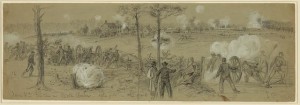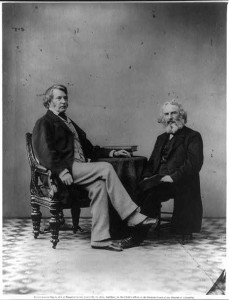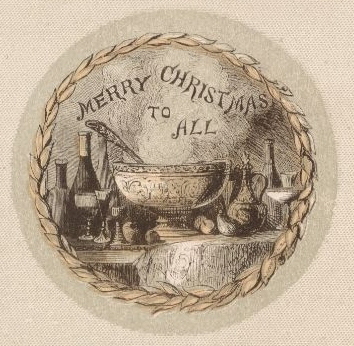For a time when I was growing up I loved playing and playing Christmas records on our family’s hi-fi – day after day throughout pre-Christmas December. I especially remember a couple of the W.T. Grant’s “A Very Merry Christmas” albums we had. One of the songs that made an impression was Johnny Cash laying down “I Heard the Bells on Christmas Day”. I’m pretty sure that had to blow a few sugar-plums out of my young head.
It is written that the song was based on a poem, “Christmas Bells”, by Henry Wadsworth Longfellow. He wrote the poem on Christmas Day in 1863. Longfellow was responding to a son recently wounded and the 1861 death of his beloved wife as a result of a fire:
During the American Civil War, Longfellow’s oldest son Charles Appleton Longfellow joined the Union cause as a soldier without his father’s blessing. Longfellow was informed by a letter dated March 14, 1863, after Charles had left. “I have tried hard to resist the temptation of going without your leave but I cannot any longer,” he wrote. “I feel it to be my first duty to do what I can for my country and I would willingly lay down my life for it if it would be of any good”. Charles soon got an appointment as a lieutenant but, in November, he was severely wounded in the Battle of New Hope Church (in Virginia) during the Mine Run Campaign. Coupled with the recent loss of his wife Frances, who died as a result of an accidental fire, Longfellow was inspired to write “Christmas Bells”.
Thanks to modern technology and the Grant’s link above I just listened to the Johnny Cash rendition again. It was a little more produced than I wanted to remember and does not include the more menacing and Civil War specific stanzas mentioned at Civil War Daily Gazette. (No longer online)
Down in Richmond speculators and extortioners were identified with Scrooge and more charitable citizens were urged to visit the suffering, wounded, Confederate soldiers in hospitals. From the Richmond Daily Dispatch December 25, 1863:
Christmas.
One of the most charming productions of Dickens in that “Christmas Carol,” in which he tells of an old miser, Scrooge, whose cold nature was unlocked by the genial inferences of a certain Christmas, and who became thereafter the most benevolent and charitable of mankind. We wish that some of the persuasive visions of Christmas past, Christmas present, and Christmas to come, which worked such a wholesome influence upon the mind of the English miser, could make themselves left in the adamant natures of our Confederate Scrooges. Objects of compassion may be found at every step, in comparison with whose condition that of Bob Crotchett and Play Tim was happy and luxurious. We should like to know whether Christmas, which showers its bounties upon the heads of the extortioners and speculators, will melt their hearts towards their suffering fellow-men, or whether even the warm rain of Divine benevolence will freeze as it falls through such an icy temperature.
We can scarcely bring ourselves to wish our readers a merry Christmas in such an ere of selfishness and coldness of soul. The face of nature itself is not as dreary, the frozen streams are not as cold, as the hearts of men have been rendered-by the absorbing thirst of gain and gold. Beneath the hard crust of the earth lie buried those principles of life which will clothe its surface with the beauties of spring and the harvests of summer, and the imprisoned waters will soon break their icy chains and run-warm and sparkling in the sun’s fervid rays. But what life is there in the soul cankered by the greed of gain? What spring shall cause the desert to blossom or the arctic ice to melt?
But even amidst the general corruption there remain some men who hold fast their integrity, and to them we appeal to celebrate this Christmas by deeds of extraordinary mercy and charity to the extraordinary sufferers by this war. In the hospitals and in the habitations of the poor are hundreds and thousands whose Christmas will be sad and solitary unless cheered by the visitations and benevolence of those whom Providence has made the objects of its blessing and the almoners of its bounty. Amid the solemn scenes of this awful struggle we can in no way celebrate Christmas so appropriately as in those acts of mercy and compassion which bless him that gives and him that receives. He that remembereth the poor will be remembered by God in his own time of trouble and affection.
Church bells (probably) and the suffering wounded were Christmas constants both sides of Mason-Dixon 150 years ago.
You can see great photos of Henry Wadsworth Longfellow, Frances, and Charles at Hidden Cause, Visible Effects



